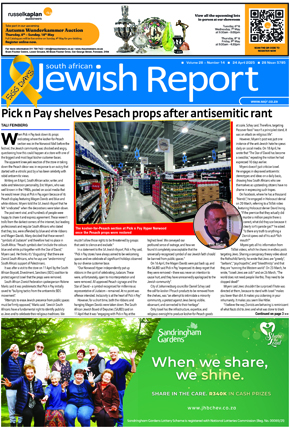Social Media Policy
Preamble
There is no fundamental difference between online journalism, of which social media is a subset, and traditional journalism.
All the same rules and principles apply. Where they differ is in the pressures and form of the outputs. This means that quality can be defined differently on different platforms, but professionalism is judged to the same exacting standards.
The Jewish Report Online relies on our community of users to help us produce a better product. Social media allows us to talk to our users on multiple platforms, and opens up new audiences for our content.
The network effect means that our core readers disseminate our content to their followers.
On social media platforms, Jewish Report can source and disseminate breaking news. We can also break news and use social media to verify news. We can pick authoritative sources from a wide pool, and use our community as a sounding board for ideas and opinions.
The term “Social Media” includes but is not limited to Twitter, Facebook, blogging platforms, MXit, forums and commenting functions (such as Disqus), and photo-sharing networks and applications such as Instagram.
We are aware that users consume content from people they know and trust, and they pass that content on. We are aware that we are part of a community and subject to the dynamics of that community.
We will not misrepresent ourselves on social media but will be upfront about being from the Jewish Report. We will not use subterfuge to obtain information or subvert security protocols to obtain information.
Social media are public platforms and in general in the public domain. We are mindful that some people might not fully understand this and, wherever possible, will check with people that they are aware that they are, de facto, commenting in the public domain.
In cases where public interest is the overriding factor, the issue of the expectation of privacy is less relevant.
The internet is home to much disinformation and false data. We are always aware of this, and make sure that we are suitably cautious before accepting the validity of information sourced online. This is especially important when using information sourced via social media.
We will always attribute information social media sources, be it an individual or a platform. We know that users ascribe different values to different sources, so we believe they need to know, for example, when something comes from a user on Twitter as opposed to physical investigative research.
We will ensure that we do not inadvertently betray a source or leak an incomplete story by means of tweets or posts.
We respect copyrights and fair use on social media. We will attribute and credit sources. We will attempt, whenever editing posts, tweets or retweets mark it as a partial post, tweet or retweet.
Social media are judged on the value we provide to the user and we will do all in our power to maintain the same rigid standards on social media platforms as we do in print and online.
Where the urgent dissemination of news is deemed to be in the public (community’s) interest, The Jewish Report may pre-empt our print and online news-desks by publishing information on social media platforms prior to its publication on our traditional print and online platforms. When this occurs we will advise once the full story has been published on the same social media channels where we published the advance story.
This policy of advance publishing on social media will also be followed to whet our audience’s appetite about work in progress where the story is considered to be potentially significantly consequential to users.
An example would be a security alert relating to a community event taking place later in the day. The Jewish Report Online would not be able to publish an unsubstantiated or single-sourced story without investigation and technical production – whereas on social media platforms we would be able to publish an advance warning to say we are investigating a report. In such an instance, we would use the same platform/s to update users, for example, to say it was only a rumour or provide a link to the story we had subsequently posted.
Online and Social Media Editor’s Note: Many of these points are based on those to be found on the excellent Reuters social media guidelines.









